Search Results
Showing results 1 to 20 of 42

Saldo Island: An Unfair Game
Source Institutions
In this environmental science activity about biodiversity, learners play a game to discover the effects of non-native species on an ecosystem.

Whose Fault Is It?
Source Institutions
In this seismic simulation, learners play a "who-dunnit" game to explore earthquakes.

Invent an Animal
Source Institutions
In this outdoor activity and game, learners explore how animals adapt for survival through coloration, markings and camouflage.

Amazon Water Cycle Roleplay
Source Institutions
In this creative roleplay activity, learners will explore the various processes of the water cycle using movement, sound, and props to aid in comprehension.
Coincidental Colonization
Source Institutions
In this game of chance, learners will discover how organisms colonized the Galápagos Islands, experiencing how chance plays a role in the successful dispersal of species to new areas.

Envirolopes
Source Institutions
In this outdoor activity and observation game, learners hunt for a variety of textures, colors, odors and evidence of organisms in the activity site.

Variation Game
Source Institutions
In this set of outdoor games, learners play the role of monkeys that are trying to get enough resources (food, shelter, and space) to survive.

Caller ID: The Frog - and Toad! - Mating Game
Source Institutions
This activity is a sensory experience that recreates the sounds of a pond at night.
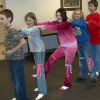
The Bug Walk
Source Institutions
In this fun group activity involving music and movement, learners are introduced to the idea that many insects walk by using their legs to create "alternating triangles." Learners sing the "Ants Go Ma

Wolf Survival is Just a Roll Away
Source Institutions
In this simulation activity, learners will raise a pack of wolves under ten different conditions: without human interference and with human interference.

Wolf Survival
Source Institutions
In this activity, some learners pretend to be wolves, while the other learners pretend to be the prey of the wolf. The goal of the simulation is to have the wolves work together to survive.
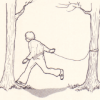
Tree Tally
Source Institutions
In this outdoor activity and fun race, learners first find the most common type of tree in a forest site.

Sustainable Fishing
Source Institutions
In this activity, learners use a model for how fishing affects marine life populations, and will construct explanations for one of the reasons why fish populations are declining.
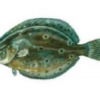
Ocean Home: Swimming Fishes
Source Institutions
In this activity, learners model, on a human-sized board game, how changes in water temperature may affect fish distributions and, ultimately, fisheries.
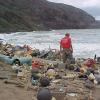
I Am/Who Has: A Litter Matching Game
Source Institutions
In this game, learners match descriptions of marine debris (shoes, batteries, paper towels, etc.) to images of these items.

Wild or Domestic Animal Game
Source Institutions
In this quick activity (page 2 of PDF), learners will play a game using their observation and listening skills, interpreting clues from each other to deduce their secret animal identity.

Match Rock
Source Institutions
In this activity, learners try to figure out who has their matching rock type by reading a description of their rock (no talking!).

The Carbon Cycle Game
Source Institutions
In this activity, learners take on the role of a carbon atom and record which reservoirs in the carbon cycle they visit.

The Carbon Cycle: How It Works
Source Institutions
In this game, learners walk through an imaginary Carbon Cycle and explore the ways in which carbon is stored in reservoirs and the processes that transport the carbon atom from one location to another
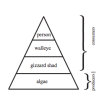
Who Can Harvest a Walleye?
Source Institutions
This activity focuses on interactions within Earth systems and the effects of human activities. In this activity learners build a biomass pyramid.
